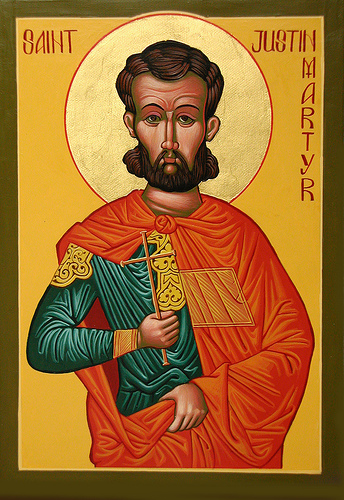 For the next three weeks in the JP2 Group we’re going to be looking at the worship in the Early Church.
For the next three weeks in the JP2 Group we’re going to be looking at the worship in the Early Church.
The following text is an extract from the writing of Justin Martyr (c AD 100 – 165). The document is known as his First Apology, which was written to the Emperor Antionius Pius around AD 150-155. Various English translations were used in the rendering of this extract.
We will be studying this text as a group tomorrow. At the weekend I’ll do another post about this text, together with a little bit of commentary…
Chapter 65: Baptism & Eucharist
After we have washed someone who has been convinced and has accepted our teaching, we bring him to the place where those who are called “brethren” are assembled. Together, then, we offer hearty prayers: for ourselves, for the illuminated person, and for all others in every place. We pray that we may be counted worthy, now that we have learned the truth, by our works be found good citizens and keepers of the commandments, so that we may be saved with an everlasting salvation.
Having ended the prayers, we greet one another with a kiss. Then bread and a cup of wine mixed with water are brought to the president of the brethren. Taking them, he gives praise and glory to the Father of the universe, through the name of the Son and of the Holy Spirit, and he offers thanks at considerable length for our being counted worthy to receive these things.
And when he has concluded the prayers and thanksgivings, all the people present express their assent by saying “Amen”, the Hebrew for “so be it”. And when the president has given thanks, and all the people have expressed their assent, those who are called “deacons” give to each person present a portion of the bread and the wine mixed with water, over which the thanksgiving was pronounced. To those who are absent, they carry away a portion.
Read more

 This Sunday we hear a glorious mystery! The
This Sunday we hear a glorious mystery! The